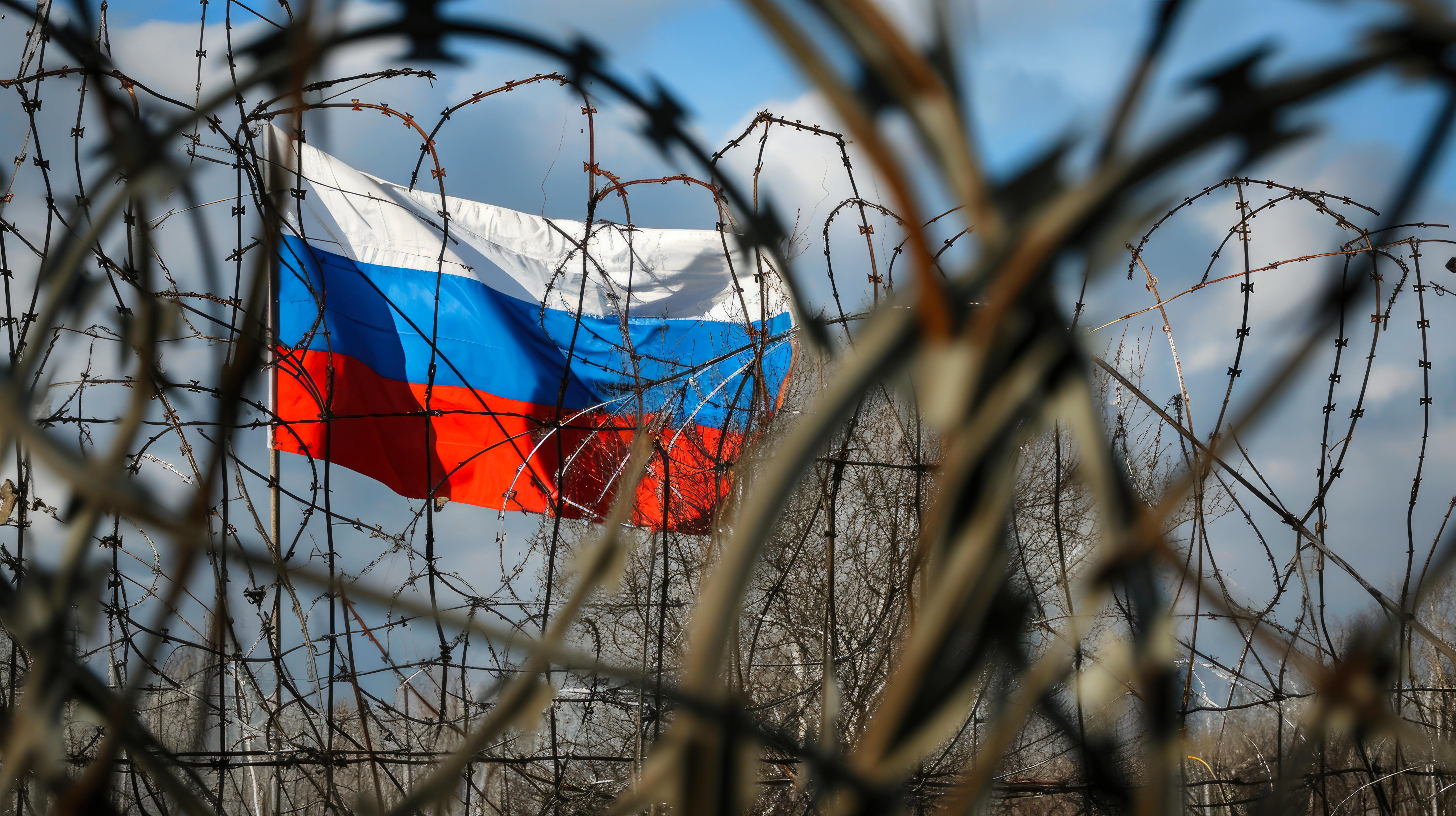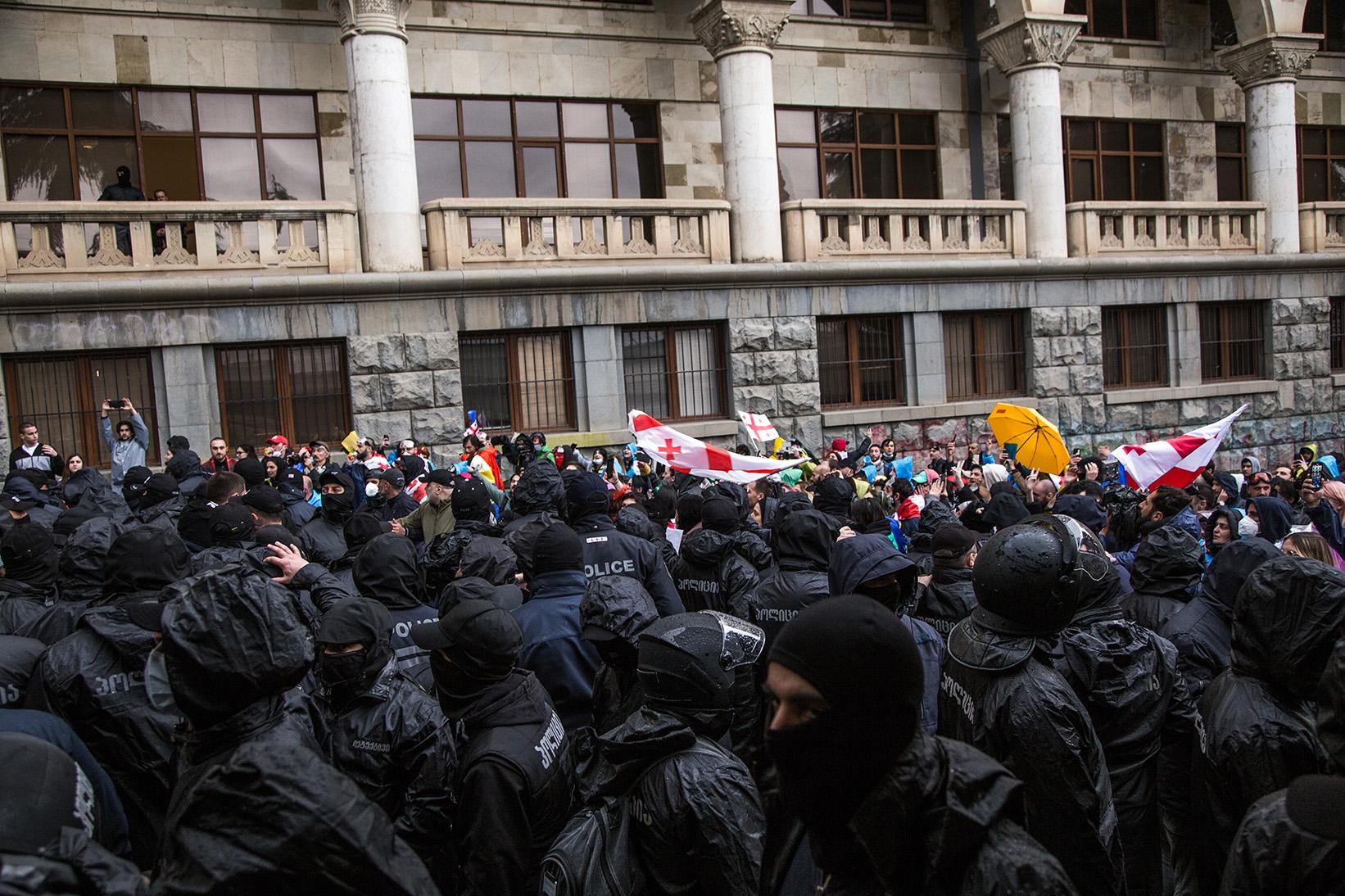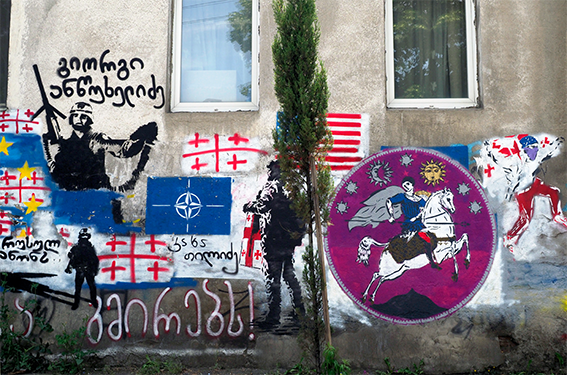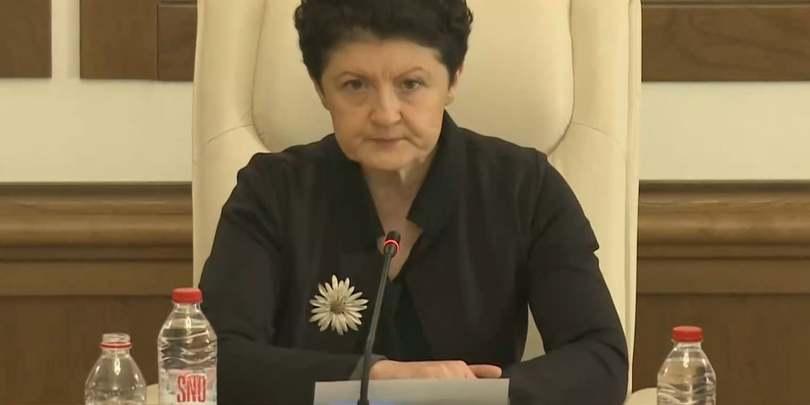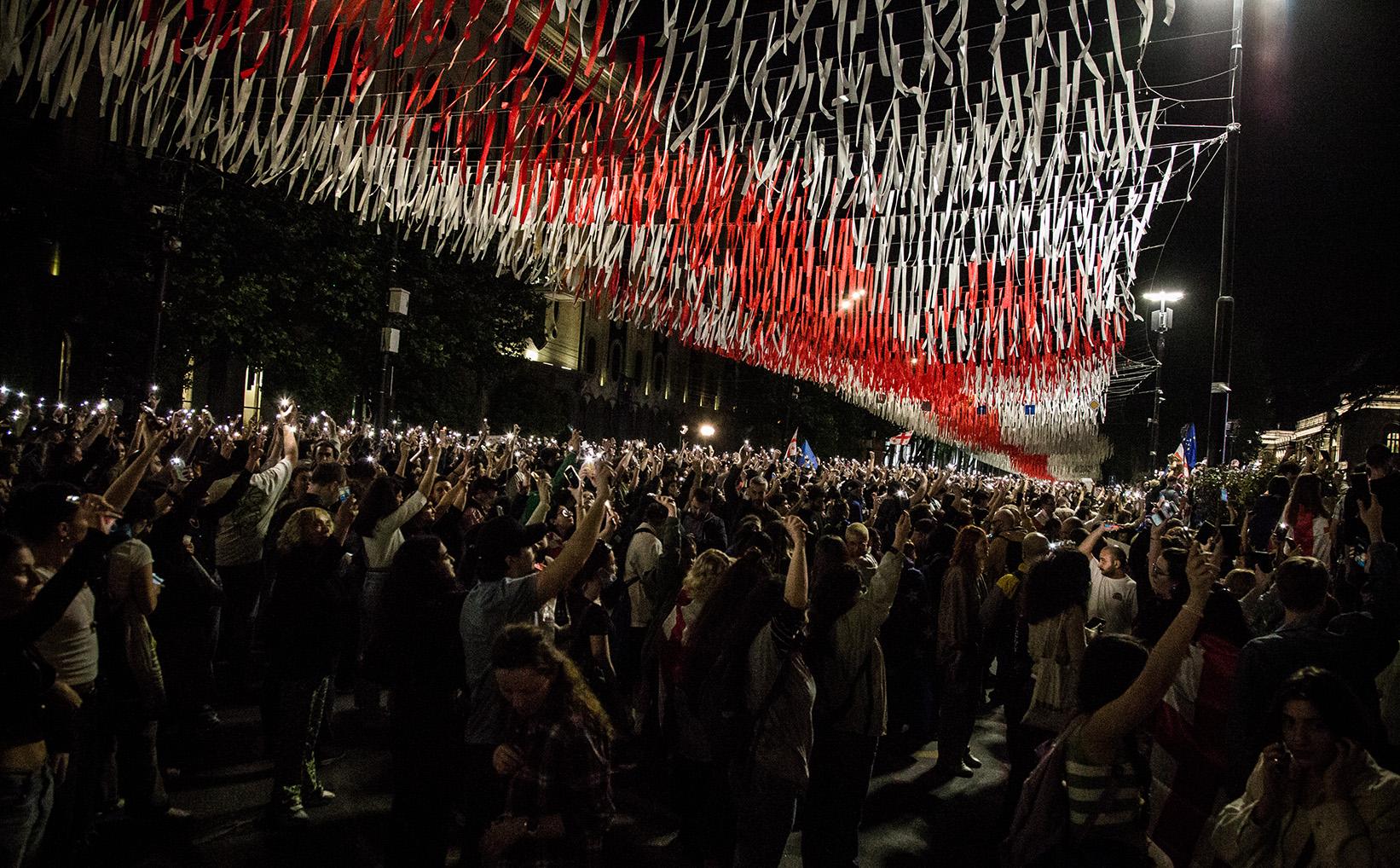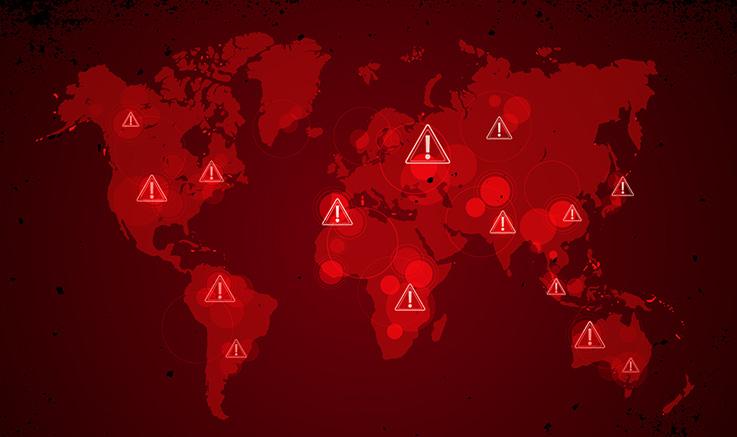
Author : Tengo Gogotishvili
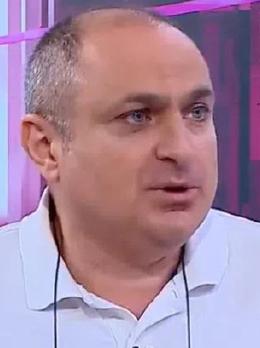
Ped of Pedologists and Pedagogues... Hybrid war
‘Moskvich?’1 – ‘No, it’s an Opel, stolen together with the factory.’
‘Lada?’ – ‘No, it’s a Fiat. Licenced only in the beginning.’
‘Volga? ’ –‘Not at all. First they stole a Ford, then a Plymouth.’
‘Space rockets?’ – ‘Oh, they started with Nazi blueprints and captive designers.’
Just like the Kalashnikov. Just redesigned.
So what is Russian technology? Does it even exist?
It does exist!
Until now, there existed only the ‘Tsar Bell’ on display in the Kremlin, which never rang. And the ‘Tsar Cannon’ from the same Kremlin, which never fired.
And now the real breaking news: Although elements of hybrid warfare have been used by humanity for millennia, it was Russia that ‘assembled’ them into a perfected form of combat. Some argue that even this was stolen—but that’s not the main point here. What matters is that Russia turned what we once jokingly referred to as the ‘three Ch’s’ into an actual policy. They thought up and designed the things that the standard Western mind would not even think of. And for this, they again used Western achievements—technology and democracy.
At the end of February in Bucharest, police stopped a car, removed one of the passengers, and took him in for questioning. It might have seemed like a routine incident, except for one crucial detail: The passenger could have been the country’s president today, had the previous president not annulled the results of the first round of elections, based, as he claimed, on information from the security services.
Calin Georgescu was released after several hours of questioning, but the investigation continued. His comrades and personal guards were arrested, hundreds of thousands of dollars and... tickets to Moscow were found during the search. This latest story seems a bit artificial, but it directly indicates where the investigation is headed—towards proving Russian interference in the Romanian presidential election.
‘“You can believe it’s wrong for Russia to buy social media advertisements to influence your elections, we certainly do,” US Vice President Vance said at the Munich Security Conference, taking time to address the issue. “But if your democracy can be destroyed with a few hundred thousand dollars of digital advertising from a foreign country, then it wasn’t very strong to begin with.”
That the Trump administration might have a liking for the far-right Georgescu is not surprising. What is truly remarkable, however, is that a pedologist—largely unknown to voters (and to clarify, pedology is a branch of soil science; he’s already had enough trouble being disqualified from the race and placed under investigation)—managed to win the first round of the election.
The explanation lies in technology, particularly TikTok, where over 20,000 troll accounts supporting Georgescu emerged just two months before the election. Most of them had Turkish IP addresses and Russian email addresses. The investigation estimated that the troll factory devoted 2.1 million comments to the pedologist candidate in one month, all positive, good and kind; that the number of likes (approvals) rose to 4.3 million; the number of views to 150 million; and that the entire campaign was ultimately managed from outside Romania.

Rasha Nedelnikov - Director, Center for Research and Transparency, CRTA
We live in such a time that it is not even necessary to specify where exactly this ‘outside’ is. What country could possibly have interest in the victory of a Romanian far-right candidate who openly opposes aid to Ukraine and NATO, but praises Putin. Or what country might be interested in, for example, influencing elections in Serbia so that the party of Putin’s ally, Vučić, retains power?
Rasha Nedeljkovic, Director of CRTA’s Centre for Research, Transparency, and Accountability will give you the correct answer: “The last parliamentary elections in Serbia were significantly rigged. Although we were unable to secure a re-run, with Western support we began working to improve the electoral environment. In the most recent elections, held in December 2023, the authorities based their propaganda primarily on the threat of war—which has become a familiar tactic. Whenever public pressure on the government intensifies, state-controlled television and other media outlets begin sounding the alarm that Serbia is under threat, that if the ruling party is replaced, Kosovo, Albania, Croatia, or Bosnian Muslims will attack us.”
According to today’s reports, Serbian President Vučić will attend the May 9 military parade in Moscow. If this trend continues, he may find himself among the usurper leaders of another Orthodox country—leaders who also govern their nation according to directives from Russia’s FSB. Their rhetoric echoes familiar Kremlin narratives: ‘the second front’, ‘Europe is a threat’, ‘NATO wants war’, ‘they are attacking Orthodoxy’, ‘they are erasing our identity’, and ‘how can Putin be an enemy?’—and so on.
We believe we know Russia well. We believe that we have thoroughly learnt all the tricks of the FSB, since, if you look a little closer, everything is easy to see and connect. But we must also admit that Russia does not change its methods of work, nor its temperament, nor its morals, from Europe to Latin America, or Africa. Somewhere it succeeds, somewhere it fails, somewhere it completely collapses.
‘Before the 2018 presidential elections, a large group of Russians arrived in the country,’ says Madagascar-based investigative journalist Gaëlle Borgia. ‘They introduced themselves as experts in elections and communications, opened an office, and began working with various candidates. Later, we discovered that the entire team was linked to Wagner founder Yevgeny Prigozhin. They brought in large sums of untraceable, black money. They worked with roughly a third of the 36 presidential candidates, with the understanding that in the second round, all votes would go to a single agreed-upon candidate. They expected the incumbent president to win—as is often the case in Africa. But they miscalculated. He lost. And so did the Russians.’

Gael Borgia - Investigative Journalist
When you manage to lure the incumbent president and a dozen other candidates—and still lose—there’s not much to boast about. Especially when you’ve poured millions into the effort. In the BBC investigation, several candidates and their campaign officials confirmed that the Russians approached them directly, offering suitcases full of cash and assuming full control over campaign operations. One of the key figures involved was political technologist Maxim Shugaley. He later fled Madagascar, but his activities didn’t stop there—in 2024, he and his team were arrested in Chad.
‘It begs the question: in the eyes of the Russians, how close are we to a distant African island?’
‘At the Russians’ insistence, the core message of their candidates had to be anti-Western—that was their strategy for winning the election,’ explains Gaëlle Borgia. “More specifically, it was anti-French, given that Madagascar is a former French colony. The Russians actively sought to exploit that sentiment. They even organized protests outside the French embassy, paying demonstrators to shout slogans. Beyond politics, they also had clear economic interests—namely, gaining control over the country’s strategic assets.’
If suitcases full of cash and chants of ‘the West is bad’ work in Africa, why wouldn’t they work in the post-Soviet space? Especially when it’s easier to move money across the border from Russian-occupied Transnistria? This is how Russia spent at least €100 million on Moldova’s presidential elections last autumn. That’s just the amount that was tracked—some of it discovered by police in hidden caches at opposition headquarters. Even so, most of the funds were successfully spent or distributed. In some cases, quite literally scattered to the wind: Russia was so determined to defeat Maia Sandu that it flew thousands of Moldovans living in Russia to Istanbul, then on to Bucharest, and finally bussed them into Moldova to vote—before sending them back the same way.
And how far away are we from Moldova, which is right next door?
According to a report released by the country’s Security Service after the second round of elections, Russia did everything it could to defeat Sandu and disrupt the referendum (on establishing EU membership as a constitutional obligation—T.G.). It is also expected to do everything possible to defeat Sandu and the pro-European forces in the upcoming parliamentary elections scheduled for May–June 2025. The Kremlin’s main tool in this effort is oligarch Ilan Shor, who has been hiding from the Moldovan judiciary in Moscow for several years. He serves as the key intermediary for delivery and distributing Kremlin money in Moldova.
Moldova, like us, has not yet fully escaped from the Soviet Union. But the Baltic States have broken free and are now trying to lock their doors so that no one can drag them back to Russia, while Russia is trying relentlessly. It uses its own specific techniques against each country, but in the end, like with all great maestros, its signature remains unmistakable.

Elina Lange-Ionatamishvili, Senior Expert, NATO Strategic Communications Center
The struggle in the digital sphere may seem to some like a mere nuisance—just a kid sitting in front of a computer—at the state level. But it has long since outgrown this stage and has become a perfect weapon.
For years now pilots in the Baltic Sea region have been complaining about GPS signal interference or complete disappearance. After 2022, such ‘nastiness’ intensified, and in the last year it reached a really dangerous line. Pilots on several thousand flights each year are now experiencing satellite signal problems that are potentially fatal. Everyone knows who’s doing it. Everyone knows where it’s coming from. In the Kaliningrad enclave, Russian electronic warfare equipment seems to be deployed in abundance.
But Kaliningrad alone is no longer enough. A few years ago, a Russian citizen was granted permission to build an Orthodox church near Västerås Airport, outside Stockholm. A Swede could imagine many things—but the idea that a Russian would use an onion-domed church for espionage surely wasn’t one of them.
It wasn’t until a 22-meter bell tower was constructed just 200 meters from the runway that Sweden’s security services began to take a closer look. According to a spokesperson for the Swedish counterintelligence agency Säpo, representatives of the church were found to be connected to Russian intelligence spies active in the country: “Russia is using the Orthodox Church as an intelligence platform in Sweden.”
The Swedes are now actively watching Russian intelligence agents, who are actively watching Swedish counterintelligence agents. The only active action they have taken is cutting off the state funding that the Swedish budget had generously paid to the religious organisation for many years.
It’s likely that even now, someone in the FSB is chuckling at how democracy operates. Emboldened by past successes, they pushed further along their well-worn path. A large plot of land and property was purchased—this time near Sweden’s ultra-modern Muskö naval base—under the name of a Russian businessman. A similar tactic was used in Norway, where two Russian citizens acquired ski resorts near the Bardufoss military airfield, providing a convenient vantage point for surveillance.
In 2016, NATO’s Strategic Communications Centre, based in Riga, launched a study into Kremlin sabotage activities targeting the Baltic and Nordic countries. The project began, but, as the saying goes, it never really ended, because stopping Russian interference had become nearly impossible.
“I can briefly tell you, for example, what their ultimate goal is in Latvia,” says Elina Lange-Ionatamishvili, head of NATO’s Strategic Communications Center, who shared the results of a study published a couple of weeks ago. “They are trying to bring in a government that, if not friendly to Moscow, will at least not resist its hostile actions. It will remain silent when Russia tries to conquer other countries. This should be a silent, covert occupation, so that they have their own agent in the two most powerful alliances, NATO and the European Union.”
What prevents Moscow from having agents inside NATO and the European Union? Well, they practically already have them running Hungary and Slovakia. How far, then, are Latvia or, for example, Estonia from having a fifth column at the helm?
According to official statistics, ethnic Russians make up 23.7% of Latvia’s population and 22.5% of Estonia’s. Typically, they have their own representative political forces, which they traditionally vote for. However, not once since these countries gained independence have ‘Russian parties’ won a parliamentary majority—let alone secured a place in a governing coalition.

Jurgis Norvaisha - Officer at NATO Strategic Communications Center
Let’s admit the uncomfortable truth: For this, both Latvia and Estonia have long faced criticism, even from within the democratic world. Phrases like ‘inclusiveness’, ‘human rights’, ‘Baltic apartheid’, and ‘minority rights’ are echoed frequently—even from Brussels.
That was until Putin launched his continental offensive. Only then did ‘old Europe’ begin to acknowledge that by advocating for the supposedly violated rights of ethnic Russians, it had been inadvertently playing into Moscow’s hands.
In the end, the story culminated in the revelation that the main lawyer for the Russian-speaking population of Latvia, Tatiana Zhdanoka, once a mathematics teacher and by that time a member of the European Parliament, was charged with having ties to the FSB.
‘Moscow sees dividing our societies as a more attainable goal than changing our governments,’ says Elina Lange-Ionatamishvili. ‘This is how it attempts to undermine our resilience. It constantly pushes the narrative that we are failed states, that this region isn’t worth defending, and that NATO allies won’t come to our aid. But that is a fundamental lie—they are already here.’
Indeed, NATO Allies are already present in the Baltics. As part of NATO’s Enhanced Forward Presence initiative, allied contingents have been stationed at military bases in these countries for the past eight years. NATO’s plan is to increase the size of the groups to brigade level (3.5-5,000 troops). After the outbreak of a full-scale war with Russia in 2022, NATO extended this experience to all other member states bordering Ukraine.
It all began when NATO ‘closed’ the skies over the three Baltic States the very next morning after their accession—on 30 March 2004. Since then, allied fighter jets have been rotating deployments every four months, first in Lithuania and now also in Estonia, patrolling their airspace.
Who they are protecting against hardly needs to be said.
When a Russian aircraft appears on your radar, it may be too late. Are there tell-tale signs that will unmistakably indicate that Russia will attack you tomorrow? There are for tomorrow. And for the day after tomorrow. And then it gets harder and harder.
Jurgis Norvaiša, an officer at NATO’s Strategic Communications Centre, says: ‘We analysed Russian government media and social media to find unmistakable signs of the outbreak of war. We started our research in 2021. Others tried to do it before us, but it turned out to be very difficult. Only since 17 February 2022 (1 week before the beginning of the large-scale war—T.G.) some other accents have been observed. The conclusion is that Moscow is constantly preparing an information attack. Every day it deliberately publishes false information so that public opinion is constantly ‘ready’.
In the study, which has not yet been published, the Russian information system is a unified space. ‘At the core is government information—as a common, tone-defining, line,’ says Vice Colonel Norvaiša in an interview with us. ‘Below that, everything is distributed. Statistically, most of the Russian population gets information from television, then comes Telegram and other platforms. There is a more interesting statistic—state TV channels are fully trusted by more than 50 percent of the population. It is a very specific fact that even those who seek other information and, for example, regularly use VPNs, more often still trust government sources. Susceptibility to other information is very low in Russia.’
If we translate the words of a professional into simple language, then a Russian, whether you explain the truth or not, still believes what the authorities tell him.
Now, I know that many of you are wondering how far we are from Russia if, despite the availability of information, the majority of people still believe only propaganda.
The rise of social media has undeniably multiplied the volume of information we consume. But the more dangerous consequence is that it has drastically reduced the time we have to process it. Today, when someone picks up their phone, they are just as likely to absorb content without reflection as someone who swallows food without chewing. This phenomenon has been thoroughly studied by those who seek to control public perception—and, quite simply, want to ‘feed’ your mind. In an overloaded information environment, we often lack the time or energy to separate truth from falsehood, and so we end up ‘devouring’ everything indiscriminately.
Readers may recall that Meta has repeatedly purged Facebook and Instagram networks in Georgia, each time removing hundreds of accounts, pages, and groups. ‘Our investigation found links to the Strategic Communications Department of the Georgian Government Administration,’ stated Meta’s Quarterly Threat Report in 2023. According to the same investigation, the Georgian government spent $33,500 on Facebook and Instagram ads alone. The same thing happened in 2019, 2020, and other years, and again the trail led either to the government administration or to Koka Kandiashvili2. Which is basically the same thing.
Thinking back, in 2024, Meta discovered thousands of fake accounts and pages in Moldova, the purpose of which was to discredit Maia Sandu, promote the ‘normalisation’ of relations with Russia and call for a ‘no’ vote to the European Union in the referendum. At the same time, the Moldovan authorities themselves blocked dozens of Telegram channels that were ‘trying to bribe voters’.
Even before deploying military forces, Putin sent cyber troops to Ukraine. Since 2022, Ukraine’s Security Service has uncovered more than 100 hidden ‘bot farms’. To grasp the scale of this digital terror: The infrastructure reached around 12 million Ukrainians. These operations distorted historical facts and spread Kremlin propaganda about a shared faith and common past; they promoted a narrative of defeatism, exaggerated the strength of the Russian army and its weapons, and eroded the will to fight for Ukrainian sovereignty. In essence, they carried out a classic psychological operation targeting nearly a third of the country’s active population. Some were more exposed to this operation, some less. But the FSB’s many years of diverse, multilingual, and multi-continental experience guarantee that it did not go unnoticed.
Neither fake pages nor online manipulation are the invention of Russians, let alone Georgian Dreamers. It is a widespread practice and a major headache for all social platforms. NATO has been studying the issue for years. It turns out that it is much easier to create false statistics on social media than to remove them.
Gundars Bergmanis-Korats conducted his experiment again at the end of 2024. The same one he has been conducting since 2019. First, he created fake accounts and published 44 completely harmless, apolitical and non-provocative posts on several platforms, then he bought ‘statistics’, a service that quickly and with a high guarantee increases views, likes and comments, from companies specialising in it.
‘For just 58 euros, we got 1,150 inauthentic comments, 11,725 likes, 3,150 shares and 8,233 views on Facebook, Instagram, YouTube, TikTok, VKontakte, and X. If we compare it to the 2022 experiment, we got roughly the same statistics for three times cheaper,’ Bergmann-Korats summarised the results. ‘The most expensive of these are Facebook and Instagram comments. Because the text has to be provided to the executor and then he will post it on behalf of different users over a period of time. However, as technology advances, we expect artificial intelligence to take over the function of creating comments, and this service will become even cheaper.’
But the purpose of the experiment was not to expose those Russian and other companies that sell you this fake ‘engagement’. The main thing was to establish how well the ‘self-monitoring’ of these platforms is working. Here, you get a notification that you are ‘banned’ because of this and that, and you achieve nothing by appealing. So, how do thousands of Pakistani, Sri Lankan and Chinese ‘users’ remain ignored by the algorithm on the Georgia government’s or by other Facebook page, Instagram or YouTube? The outcome of Gundars Bergmanis-Korats’ experiment is not very optimistic.
‘After four weeks, on average, only 15 percent of the content on these purchased accounts had been removed,’ the researcher said. ‘In 2021, for example, the figure was 25 percent, and we still thought the system wasn’t working well. This time, X (formerly Twitter) worked best—it removed 50 percent of fake comments and activity in four weeks. The worst performers were China’s TikTok and Russia’s VKontakte—just 3 percent and 2 percent respectively.’
Any ‘Kokakandiashvili’ and ‘Hakim Pasha’3 will use such statistics, won’t they?! And will bring down on your head a whole cloaca of malicious lies, accumulated according to the instructions from the FSB textbook.
‘War is no longer fought only on the battlefield. Information attacks, cyberattacks, and disinformation campaigns have turned the digital space into a battlefield. Russia’s war against Ukraine has clearly shown us that our democracy is at risk from a distorted perception of the truth,’ said President of the European Parliament Roberta Metsola—words spoken when Europe finally became, as some say, ‘adequate’, or in other words, awakened. The answer has come more than once. On November 23, 2023, the day the European Parliament adopted a resolution declaring Russia a state sponsor of terrorism, its website was hit by the largest DDoS attack in its history.
It wasn’t the first—and it won’t be the last.
Shall I say where it came from?
